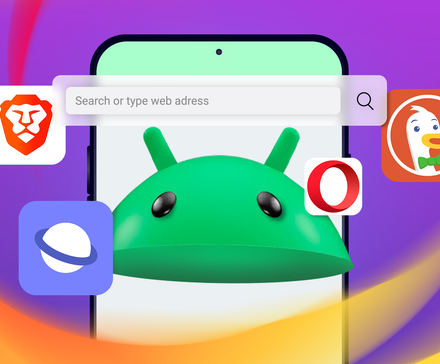For most Android users, the mobile browser space is dominated by Chrome and, perhaps, a loyal following for Firefox.
While these popular browsers cover the basics, there is one crucial area where they consistently fail us: privacy.
But among them, DuckDuckGo mobile browser has quietly evolved into a genuine powerhouse. It’s the browser nobody is talking about in the mainstream, yet it offers a set of default security tools.
Let’s dive into how this underdog challenges the defaults and delivers a browsing experience that beats the giants.
A simple, straightforward UI
DuckDuckGo has a straightforward UI, and it feels like a breath of fresh air compared to the feature bloat I have seen in other browsers. What I truly appreciate is the design team’s choice to prioritize focus.
There are no unnecessary website shortcuts, cluttered wallpapers, or distracting news feeds plastered across the main screen. My homepage is simply a search bar and a clean slate that allows me to start a browsing session without distraction.
The key to its exceptional usability. There is a smart implementation of the bottom bar. Everything I need — the address bar, search access, the tabs button, and crucially, the Fire Button — is placed right within easy thumb reach.
This makes the browser easy to navigate with one hand. I’m not digging through multiple menus to access my tabs or clear my history. All the essential controls are right there. I feel like this design truly respects my time and attention.
Essential privacy features
DuckDuckGo is packed with privacy features. The best part is, they are all enabled by default. I didn’t have to dig through complex menus or toggle thirty different switches to activate my protection.
A neat add-on is third-party tracker loading protection. The browser is aggressively blocking hidden trackers from giants like Google and Facebook before they even have a chance to load.
This gives me immediate peace of mind and often makes my browsing faster.
The Fire Button is my favorite; it’s the ultimate control switch. With one tap on the bottom bar, I can instantly burn away all my tabs and collected data. I don’t have to clear my history or cookies ever again.
I also appreciate the technical protections running in the background. For instance, the app automatically enforces smarter encryption and forces sites to use HTTPS whenever possible to protect my data from network snoopers.
I use SwiftKey on my Android phone, and DuckDuckGo automatically enables the private mode on it so that the keyboard doesn’t learn from my browsing patterns.
Packed with features and customization options
I might have been drawn to DuckDuckGo for its privacy, but I was surprised by how many subtle, convenient customization options it offers.
It doesn’t bombard me with visual themes or force me into complex settings, but it gives me control where it counts.
For example, Duck Player is one of my favorite features. For instance, I can open a YouTube video without loading the usual trackers. It unlocks a clean, distraction-free viewing setup that still respects my privacy.
When it comes to tab management, I prefer the List view so that I can manage dozens of tabs efficiently. I also added the home screen widget right away and enjoy one-tap access to a private search.
Built-in AI integration
I was initially cautious about using AI within a privacy-focused browser, but the implementation of Duck.ai won me over. The biggest selling point, for me, is the control over the model I’m talking to.
I can go to the Duck.ai section to see a list of major players like GPT-5, Llama 4, Mistral, Claude, and more. I can click the one I think is best for my specific task.
For instance, if I want something highly creative, I might pick Claude, but if I need fast information, I can switch to a specific GPT model and immediately start a new chat with the model of my choice.
This ability to mix and match LLMs without needing accounts for any of them is quite handy. Besides, my chats are private and not used to train any AI models.
DuckDuckGo has native apps on all platforms, like iOS, Android, Windows, and Mac. I can start a search or save a bookmark on my Android phone, and when I sit down at my Mac or the Windows desktop, I know that data will be available there too.
Make the switch
DuckDuckGo mobile browser is the silent winner in the modern Android browsing space.
It offers privacy by default, leveraging powerful, user-friendly features for simple data clearing, tracker blocking, and more without any ads or news feeds.
If you are tired of being tracked and profiled, the choice is clear: Switch to this quiet champion and enjoy an internet that truly respects your boundaries.
If DuckDuckGo doesn’t work, check out Brave, which is another robust alternative to Chrome and Firefox.


